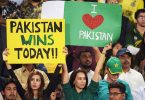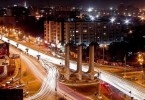To be quite blunt and straightforward, is it because we are what we are or because we aren’t what we should be?
If the question lingering over Pakistan’s apparent crisis in its self-image was to be put in an intermezzo, it would have to be the aforementioned one. Nods of disapproval would await you if you dare assert that there’s no incontestable distinction between Indians and Pakistanis that extends further than the border between them while a similar and yet more condemnation will be directed at you if the mere thought of Pakistanis being Arabs ever crossed your mind. So, what is it about Pakistan that has propelled it forward for nearly 70 years. There can be no denying the obvious fact; Pakistan’s very promulgation is an abject exception to the identity cliché that has come to be associated with other nations. And yet, for all of its supposed miraculous conceitedness in relation to its past, what is Pakistan exactly? Or more precisely, what does it epitomize?
But why does this question need to be asked, even after all these years? 70 years, though by comparison to some other countries of the world still in infancy, and rightly so albeit in matters of economics and indeed geopolitical clout. However, on the issue of identity it seems that 70 years would firmly allow any country to understand where it stands on this particular subject and how it moves forward in reforming or more eloquently, ameliorating this particular facet of it.
Nation-state or a State-nation: Pakistan in Prerogative
One must understand exactly what this identity is. Is Pakistan, to put it, in an albeit clichéd terminology, a nation-state or a state-nation?
There are partial and dubious distinctions, antagonistic to what others might say.
By deliberating on the fundamental concepts and the proverbial “meaning” of these terms such as nation-state, nation, country, and state, it can be safely concluded that not all of them are exact synonyms of one another, and are four discrete admittances. Each term, or word for that matter symbolizes a completely independent meaning that proceeds to illustrate unique designs. Typically, the ideal synonyms result in fewer diverse references. Additionally, for those willing to dwell deeper into this rather obfuscating idea, even the most basic form of scouring on the internet will allow the chance to recognize the distinct expressions that these words represent and how taken as individual context, their meaning both implicit and implied can be so radically diverse.
The sub verse non-clarity of this proposition is apparent in its presumptive form, by what criteria is a morsel of land described as a nation-state, state, nation or a country. By general assumption, it isn’t much concern when discussing these concepts in everyday usages, they are all meant to make the same sense. Within a particular sphere, like international law there should exist cohesion regarding the exact meaning of them, as these can become the source of information in the grander scheme of things and more importantly in the understanding of this issue.
It should also be noted that many of the prescribed delineations observed are simply – putting it mildly – not true. For example, “nation-state” is the least hazy, because it overtly circumvents the needs from the intended audience to draw a clear distinction between the state and nation. Americans, for example would call the United States of America, a nation or on a more geographically accurate scale, a country with 50 main secondary units, the states. The USA is by conjoint description that has been accepted generally, one autonomous state under international law. However, in the US law itself, it is the 50 states that are defined as “sovereign”, although they have ceded restricted fragments of sovereignty to the federal government, most conspicuously regarding international affairs.
A layman in this matter would often believe state means a national subdivision, but this is only true in amalgamated nation, as far as the general norm goes. Just north of it, Canada proclaims itself to be a confederation, which seems to be a synonym for a federation, but contradictory to the US, uses the term province in place of state.
Though by purely professional decree there is no sense, at least practically, in which the above four terms are not synonyms in general parlance. It would not only be acceptable, but also not entirely inaccurate to use these four terms to mean a self-determining state under global law. Though in the recorded history of the current global, political, and economic continuum, it is unlikely that a self-professed nation-state is used as a mere subordinate element in a federation.
Upon further inquiry into this particular terminology and its perceived usage in both print and speech, it is laid bare that in quite a prudent yet suave play in linguistics, a nation-state is often defined as a “form of political organization in which a group of people who share the same history, traditions, or language live in a particular area under one government”. Similarly, a more refined form of phrasing it with a particular emphasis on its more physical manifestation, “A nation state is a geographical area that can be identified as deriving its political legitimacy from serving as a sovereign nation”.
A state is, in intended form, a political and geopolitical entity, while a nation is more, by definition, a sum of its cultural and ethnic characterizations. It can drive a sane person towards a tip of insanity if he’s left brooding on this particular drafting of above. Isn’t political aspiration partially subsumed in the concept of geopolitical collectivism, likewise ethnic and cultural?
Of course, one can always argue that nations are generally grander than countries, contributing the same definition for both, minus the omission of “grander” in the latter, which leads unsurprisingly to another question: Why would traditionally integrated units be demarcated as larger than political entities? And therein lies the conundrum that the Islamic Republic of Pakistan faces. It was Islamic ambition veiled as a firm political decree that led the struggle for this country. “A country for a nation”, as some would call it. But a nation of whom? A nation deriving its root from religion or culture? A nation of Muslims that have an internal conflict, most notably the Shia-Sunni split or a nation of Punjabis, Bengalis, Baloch, Sindhis and Pakhtuns etc.?
In most reputable pieces of literature on this subject, particular those in the more sophisticated Oxford-esque corners of the suave English speaking world, sovereignty is mentioned at almost a parallel scale along with states, but and it this important, that it is optional, implicating that sovereignty is not a necessary component of either. It should be noted here that the dictionary has a comparatively multifaceted explanation of nation-state than of nation or state, hitherto it is still not clear there is a distinction (or even if there is one to begin with!) nor does it appear cogent that “reflective definitions”, two synonyms that contrast only in size of the entity being addressed makes sense (it is now incongruous in terms of proportions) or that it produces a sense of not quite the elaborate synonyms. By a simple verbose thought considering the exact paradigms of defining it or more precisely in order to put into words, it should state that “a country can be sovereign, or occupied by a foreign sovereign”, but this appears to be wholly fictitious of a nation. For example, West Germany was a country throughout the Cold War, but Germany became a nation when the enforced shadowy occupation finished upon reintegration. A nation under division is not a nation et al. The consolidation of the culture that binds them together is what forms the fabric of a nation.
And by these banal measurements, it brings us right back to the initiation of this question. If what a nation categorically requires is traditional camaraderie, predominantly language, as many urge and the common rational thought insists, then China would certainly not be termed a nation, as it has no fusing language. “Chinese” is an all-inclusive language clan, no more commonly comprehensible than the languages of Europe. Ask a pro-Maoist Chinese about the divergence of Mandarin and Cantonese, and you’ll see the point being made.
A concrete argument in this matter would be the use of all these positions is compound in unitary (non-federate) states that comprise self-governing sovereign subdivisions like found in Brazil or Russia. These sovereign tracts are allowed to exist, or more accurately allowed to come to existence because of extreme contrast in culture/ethnicity that the country possesses. So, are they nations? Yet, since the smaller components are nations, they aren’t countries per the more established version of how nations are larger than countries. Obviously, what is not a nation cannot be a nation-state, so they are apparently just, states?
Was it a mistake all along?
Starting off, why is this even a problem to begin with? How was it allowed to fester all these years and upon its – excuse the term, identification – allowed to continue?
One would do good to call upon the wisdom of the stoic Roman emperor, Marcus Aurelius who was the living embodiment of what Plato called “the Philosopher King” in his chef-d’oeuvre, The Republic, the book that effectively founded Political Science. One of Aurelius most quoted ideas are, “Of each particular thing ask: what is it in itself? What is its nature?”. Pakistan’s problem needs to go through a similar dissection, where does this problem really start and is there an underlying mutilated fact in its foundations, perhaps a lingering white elephant in the room that no one in the country wants to face?
From their very commencements in the academic foray, children and wards in Pakistan’s both private and public schools are presented with literature that has been designed, to educate them -or putting it a little more punitively – indoctrinated. Though in the defense of the state, there’s legitimately no other country in the world that can lay a claim on being pure of this act, not in the civilized world at least. So, what exactly is this indoctrination supposed to achieve, it is one would imagine pretty minuscular, but in the grander scheme of things, the future generation of the country is the subject here.
Iqbal, long considered the intellectual marrow of a country so desperately in need of it, once proclaimed that no other concept other than religion itself, and to be quite precise, Islam can unify the masses of India and the lands inhabited by those who follow it. Culture, caste, creed, class and education are but the mild additions that Muslims bring upon themselves, referring back to Aurelius’ statement, “This is what Muslims are in their selves, Muslims. Nothing more, absolutely nothing less”.
An idea that brings upon emotions ranging from pride and unity to untethering fervor for fellow brethren, it seems true once taken on its face value. Is it not religion that acts as the single greatest unifier, and divider in many aspects. Can anyone really come upon with another point of identification, where people cling to it as fanatically as they do to their religions? And were the Crusades, not testament to this notion. Where people who were busy in petty squabbles in both the European and Arabian peninsulas, united under the cross or the star and crescent to defend this particular identity of theirs’s. No other identity can make people so readily and hastily agree to take up arms in its defense, no other identity brings upon such an emotion. Or does it?
As mentioned earlier, taken purely on its face value, Iqbal makes a point excellent with regard to its appeal to the masses’ emotions and zeal, however, rationally with what’s happened in the years since Dr. Iqbal departed, one has to wonder whether he’d have maintained this position of his, or whether he understood the graveness of his suggestion with respect to the political climate of the Indian Sub-Continent at the time. It’s a slogan every boy knows by heart, “Pakistan ka matlab kya la illaha illalah”, which translates word by word to “Pakistan’s meaning is there is no god but Allah”. A more literal analysis of this text would make one thing abundantly clear, the most basic and absolute tenant of Islam, the doctrine of belief in the one true God, the god of Prophet Muhammad, of Jesus, of Moses, of Islam, Allah has an undeniable presence in Pakistan’s very fabric. That such Islamic vehemence has been the characteristic mirror of Pakistan’s society would please Dr. Iqbal absolutely, but again, in what’s happened in the year since his passing, would he feel vindicated or would he be left brooding over this hypothesis of his?
Would the Fall of Dhaka, for example, have shaken his stern belief in Muslim unity, would the outbreak of a civil war in the land that chants, “Pakistan ka matlab kya la illaha illalah” have made it apparent to him that factors other than religion can play just as much of a crucial role, culture and class have become an integral part of not just the economic backdrop of this country but the societal aspect too. Perhaps, this was the case in Dr. Iqbal’s time as well, although not in such absolute terms as they are today.
Indeed, a recent survey conducted by the reputable Pew Research Center would have brought about a sense of dismay for him, where in a 2010 survey of roughly 7,000 Muslims from several Muslim majority countries were asked to reveal what lines of identity do they mostly associate themselves with. With particular regard to the Muslim identity, they did choose to identify themselves on the spectrum, however, in a way that Dr. Iqbal would not have been much too pleased with. Muslims, they all chose to identify as, but a very specific sectarian kind of Muslim. Whether it be in Jordan where Sunni Muslim was the answer given by a whopping 90%, with a similar percentage coming from respondents from Egypt. A similar kind of response was observed from other nations, where sectarian particularity was a common denominator. In Pakistan, a similar gloomy picture emerged where people were more inclined to align themselves along denominational perspectives of Islam rather than as an abject Muslim, itself. One can make a strong case, that although a bit troubling, this sectarian divide, it is still a part of the Muslim identity. If you are a Muslim, chances are vigorously high that you follow a particular school of thought. Nothing wrong with this idea in principle, however a crucial element comes into play when its practical implications are counted; more so in recent times when civil unrest has disrupted peace, tranquility and harmony among the public due to this issue. Undeniably, the idea of any conflict of thought of practice within Islam that emerged in its infancy still holds relevance today, perhaps now more than ever.
So, by the virtue of this almost undeniable idea that unity amongst nations depend on more sophisticated and erudite factors than religion alone, where culture and race play just an important part internally and economic-cum-social parity playing an equally relevant extrinsic part, is Iqbal’s original idea, flawed or rather putting it in perspective, simply obsolete?
The answer to this is quite complicated; and that would be putting it mildly. But in a nutshell, it would have to be: No. Dr. Muhammad Iqbal was not wrong and the ideologue on which the esteemed Allama chose to place his trust is still as warranted and validated as it was then, to a certain degree. How so? We have just gone through a Pew Research data, which is the absolute gold standard of any sort of research of this nature, which clearly suggests that Iqbal’s idea of a grand unification of the Muslim masses unilaterally on the basis of their faith is questionable and even verging on refutable. However, one exceedingly important detail needs to be highlighted in this particular aspect; what Iqbal professed held true for the scenario in which he saw his homeland in, and if applied in a tinkered mattered, his concept is the most honorable idea that can be conjured up taking the current Islamic world in perspective.
In the words of its founder:
Words, or to be precise, particular words can be of extreme importance and in the grander perspective, extreme motivators to infuse the masses with the necessary zeal and spirit to unify for or against an idea and be ready to give everything they have and everything they will have and everything they ever had for that one cause, words as once saying goes, “Words are containers for power, you choose what kind of power they carry” as said by Joyce Meyer.
It was the galvanizing words of the All-India Muslim League and its political lexicon that inspired a nation within a nation to aspire for something larger than life and become a living embodiment of what will of steel can accomplish. Say what you might about Pakistan and what has gone through in the intervening years, there can be no denying the idea that what was achieved by a movement driven solely by courage and ambition of a people united under their Islamic identity is unparalleled in its nature across history.
In one of his more iconic addresses to the nation,
“The adoption of Western economic theory and practice will not help us in achieving our goal of creating a happy and contended people. We must work our destiny in our own way and present to the world an economic system based on true Islamic concept of equality of manhood and social justice. We will thereby be fulfilling our mission as Muslims and giving to humanity the message of peace which alone can save it and secure the welfare, happiness and prosperity of mankind”
(Speech on the occasion of the inauguration of the State Bank of Pakistan at Karachi, 1 July 1948)
It will not take a man of bewildering intellect to dissect the undistorted message that the Quaid meant when he uttered these words. A frequent criticism that comes up whenever this topic is discussed and any evidence is given of Mr. Jinnah’s support for a model of economy and socio-political setup that supports the values prescribed by Islam is his apparent contradictory statements that seem to support a seemingly different and opposing view than the one he’s advocating for here. And the most logical response that one can make on such an impasse is referring back to another one of his landmark addresses,
“Pakistan is the premier Islamic State and the fifth largest in the world. . . The constitution of Pakistan has yet to be framed by the Pakistan Constituent Assembly. I do not know what the ultimate shape of this constitution is going to be, but I am sure that it will be of a democratic type, embodying the essential principles of Islam. Today, they are as applicable in actual life as they were 1,300 years ago. Islam and idealism have taught us democracy. It has taught equality of men, justice and fair play to everybody”
(Radio Broadcast to the People of the United States of America, February 1948)
The reasons for quoting this particular excerpt from his address is fairly simple; but to understand that it needs to be established that in this instance Mr. Jinnah was being an advocate of his newly formed state in front of what was at that time (and still is) the leader of the democratic movement in the world, an icon of liberty and justice, Mr. Jinnah was in this moment about to establish the covetous “first impression” of Pakistan in the mind of one of the – perhaps THE – staunchest allies in matters of economy, politics and societal harmony. What he chose in this instance was a firm tone to make certain that the message got through, the message: Islam is the fuel that propels Pakistan. No doubts lingered in the mind of the Quaid when he was making this speech, he was clear on this topic where he was stoic in his regard for Islamic ideology and Pakistan’s ideology to be the same and that it was Islamic principles that would formulate the moral compass that drives Pakistan forward. He makes multiple references to democracy and the vital role it will have to play in carving up a progressively tolerant and vibrant society in Pakistan, however, it should be noted he makes a distinct nod to Islamic principles each time democracy is mentioned and the emphasis is often laid on the former rather than the latter.
In the light of this statement, another myth can be eradicated that Mr. Jinnah, who it has to be noted was continuously labelled a secular and never denied that particular tag by certain quarters amidst the independence movement, states it in an unblemished lexicon, the 1300-year-old principles that many would consider outdated and obsolete in the world of today were just as relevant and applicable as then, and judging from whom he was addressing it can be established unequivocally that Mr. Jinnah genuinely considered these principles to be of immeasurable value and crucial to Pakistan’s own identity in the future.
Another such address which solidifies this case is,
“I am glad that there is full realization on your part that now the position is basically different. It is no longer a foreign Government as it was, but it is now a Muslim Government and Muslim rule that holds the reigns of this great independent sovereign State of Pakistan. It is now the duty of every Musalman, yours and mine, and every Pakistani to see that the State, which we have established, is strengthened . . .”
(Address to the Tribal Jirga at Government House, Peshawar, 17 April 1948)
Again, emphasis on the wording he chose to bring perspective to his ideas. Far too often we have had cases of politicians who have on instances pandered to the secularists or to the fundamentalists; such was not the case with Muhammad Ali Jinnah at this juncture where he made certain that his vision was not obfuscated in form. Not a government that just happens to belong to the Islamic faith by a Muslim government which would ensure firm execution and implication of Islamic ideas and principle, something which in the Quaid’s mind and vision was to symbolize Pakistan, as a modern Islamic democracy that would embrace its adapted ideology and look towards the horizon of progress.
The hypocrisy of its critics:
It would not be erroneous at this juncture to return to the original question, the initial dilemma as it were; why has this even been allowed or rather managed to turn into such a monolith of a predicament. The answer is admittedly not that simple, which is what makes way for any sense of non-clarity on this topic, Pakistan in the years subsequent to that of its independence has undergone a wave of cultural and social reformist mentality that has not always been on the same wavelength as that of its citizens. Specifically, the left-wing Pakistan has allowed itself not to be as perplexed by the modernization as it should have been with constant barrage of comparisons to that of India as a model for the restructuring of the social framework that allows a cohesion between tradition and progressiveness. It is an unhealthy obsession, some might observe. For such a comparison makes the entire idea of partition as redundant. What would then be the point of a separate country if the ultimate goal is to emulate or rather, mimic the country we sought separation from in the first place, based on irreparable differences in ideology.
Was it not this ideology that led to many not just on the Muslim side back in the 40s but also other statesmen to acknowledge the fact that through their resolve it seems implausible that Muslims would accept anything less than a separate land to ensure they have a place to practice their ideology or in the words of the Quaid himself, “carry out an experiment” based on this ideology in this new country. The experiment has been continuously hindered by these baseless appraisals of the adversarial practice.
Sure moderation should be brought in, and one could argue with the society that we have today much represents the only form of moderation one could hope to ever see fulfilled in this country but does the abandonment of the very basis of its formation make even the inkling of sense?
In years that have passed we have seen this unhealthy obsession from both sides of aisle, to be more than willing to support their cause within the country at the cost of its stability. The left clambering for a shift towards a more secular societal reformation with the right wing agenda being that of transforming Pakistan into a virtual conservative Middle Eastern-esque satellite state. Both these ideologies pose a serious threat to the very fabric that made Pakistan such a unique specimen of history. It has led to Pakistan seemingly overlooking the ideals that were meant to serve as constant reminders of the direction it was meant to take. Often the question is asked, “what is it that makes Pakistan so distinctive?”- one should add “for better or worse” to that. For many it is a poignant question to consider, after all it still hasn’t been agreed upon whether Pakistan’s future shines bright as a progressive secular country or a theocracy driven forward with emphasis on conservative ideals to ensure that its traditions and values are not marred by any false pursuits of appeasing those who deem Pakistan’s very inception a mistake.
Reverting back to an earlier assertion where the illusory idea of emulating India is frequently perpetrating by the left wing, it would bring them in great deal of misery to actually be made aware of the incredible shortcomings our neighbor had in that particular department. By no means can we lay a claim on having had the most untainted nature of governments in our 70 years, but indeed we can find better examples then a country so fixated with producing its own brand of toxic nationalism-pseudo-democracy that it will not stop at any length to amalgamate them. But rather than delve deep into that particular issue, though a lot of material is there to be delved into it seems more prudent to state in non-compromising terms the sincerest commitment that the cause of Pakistan and particularly it’s ideology craves.
Pakistan is not an Arab nation, although a simpleton’s remark it has a remarkable sense of veracity in it. So, one might by justification wonder, what are we then?
As mentioned earlier, Pakistan is a unique specimen when it comes to international spectrum of this nature. Nor are we Arab and neither is it feasible for Pakistan’s own sake to align itself on the similar sense of moral and social values as that of its Eastern neighbor. Its identity is its own to discover and forge as it seeks to carve out a recognition for itself. It is no hard and fast written rule that you cannot be a Muslim and seek to reform yourself; the same principles it can be argued holds true for a country. 70 years, seems a lot but in the grander scheme politics it is a mere blink of an eye. Nations go for decades, centuries even millennia lost in the abyss of identification and are not inclined towards the path of enlightenment for a considerable time. By comparison Pakistan can give itself a pat on the back for having at least the tenacity to reject the notion of abandoning the ideals that have led to its inception in the first place.
The debacle of Dhaka as so many please in pointing towards, as a testimony towards the failure of the two nation theory and much more the apparent collapse of Allama Iqbal’s assertion forget one vital detail. The original text of the Pakistan Resolution called for “autonomous states” and what the events in 1971 signaled towards when taken into account the intent of the Awami League to form an independent country and not amalgamate into India is the resolute feeling of the pre partition days – Under no circumstances will Muslims of the Sub-Continent except anything less than complete sovereignty”.
Furthermore, as the noted French historian Christophe Jaffrelot cites the works of another renowned British-Pakistan historian Samuel Martin Burke in his book, and one should add one of the finer books available on this subjected amply titled, “A History of Pakistan and its Origins” reaffirms the aforementioned concept of the Awami Leagues push for an independent country rather than integrating back into India. Was it not the plot that the Muslim of India be allowed to form their own sovereign country to rule according to their own religious values and affirmations and when the political instability in that country erupted, it led not the revision into the state of old but the justification of the two nation theory put into practice, ironically by the Awami League in its pursuit of an independent country.
Pakistan comprises “the land of five rivers”, origins of the Vedic civilization to just name a few retrogressions into the past of the land it covers. Identity should not be as big a concern for nation that can lay claim to such a rich and diverse history dating back to nearly 5000 years. Unfortunately, this idea only springs back into contention once it is implied that just because Muslims are in majority in these lands now it somehow interprets into the complete desertion of the past, simply not true. Being a Muslim doesn’t have to mean that roots are relinquished. Because once this particular act is carried out, there is no indigenous identity to spare.







